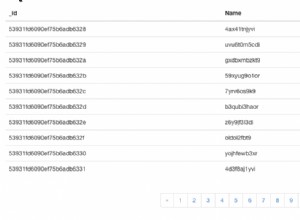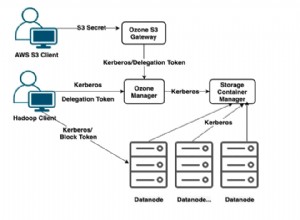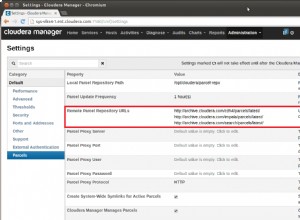Bene, la tua soluzione dovrebbe davvero essere specifica per MongoDB, altrimenti finirai per eseguire i tuoi calcoli e possibili corrispondenze sul lato client, e questo non sarà positivo per le prestazioni.
Quindi, ovviamente, quello che vuoi davvero è un modo per avere quell'elaborazione sul lato server:
db.products.aggregate([
// Match the documents that meet your conditions
{ "$match": {
"$or": [
{
"features": {
"$elemMatch": {
"key": "Screen Format",
"value": "16:9"
}
}
},
{
"features": {
"$elemMatch": {
"key" : "Weight in kg",
"value" : { "$gt": "5", "$lt": "8" }
}
}
},
]
}},
// Keep the document and a copy of the features array
{ "$project": {
"_id": {
"_id": "$_id",
"product_id": "$product_id",
"ean": "$ean",
"brand": "$brand",
"model": "$model",
"features": "$features"
},
"features": 1
}},
// Unwind the array
{ "$unwind": "$features" },
// Find the actual elements that match the conditions
{ "$match": {
"$or": [
{
"features.key": "Screen Format",
"features.value": "16:9"
},
{
"features.key" : "Weight in kg",
"features.value" : { "$gt": "5", "$lt": "8" }
},
]
}},
// Count those matched elements
{ "$group": {
"_id": "$_id",
"count": { "$sum": 1 }
}},
// Restore the document and divide the mated elements by the
// number of elements in the "or" condition
{ "$project": {
"_id": "$_id._id",
"product_id": "$_id.product_id",
"ean": "$_id.ean",
"brand": "$_id.brand",
"model": "$_id.model",
"features": "$_id.features",
"matched": { "$divide": [ "$count", 2 ] }
}},
// Sort by the matched percentage
{ "$sort": { "matched": -1 } }
])
Quindi, come sai, la "lunghezza" del $or condizione applicata, devi semplicemente scoprire quanti elementi nell'array "caratteristiche" corrispondono a tali condizioni. Ecco di cosa tratta la seconda $match nella pipeline.
Una volta ottenuto quel conteggio, dividi semplicemente per il numero di condizioni che sono state trasmesse come $or . Il bello qui è che ora puoi fare qualcosa di utile con questo come ordinare in base a quella pertinenza e quindi persino "paginare" il lato server dei risultati.
Ovviamente, se vuoi una "categorizzazione" aggiuntiva di questo, tutto ciò che devi fare è aggiungere un altro $project fase fino alla fine del gasdotto:
{ "$project": {
"product_id": 1
"ean": 1
"brand": 1
"model": 1,
"features": 1,
"matched": 1,
"category": { "$cond": [
{ "$eq": [ "$matched", 1 ] },
"100",
{ "$cond": [
{ "$gte": [ "$matched", .7 ] },
"70-99",
{ "$cond": [
"$gte": [ "$matched", .4 ] },
"40-69",
"under 40"
]}
]}
]}
}}
O come qualcosa di simile. Ma il $cond l'operatore può aiutarti qui.
L'architettura dovrebbe andare bene così come ce l'hai in quanto puoi avere un indice composto sulla "chiave" e sul "valore" per le voci nell'array delle funzionalità e questo dovrebbe ridimensionarsi bene per le query.
Ovviamente se hai effettivamente bisogno di qualcosa di più, come la ricerca sfaccettata e i risultati, puoi guardare soluzioni come Solr o ricerca elastica. Ma l'implementazione completa di ciò sarebbe un po' lunga per qui.




